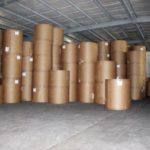In its last meeting before the EU elections, the European Competitiveness Council presented today what could be considered as its guidelines for the upcoming Commission on how to keep Europe from an industrial decline. The plan entails supporting industries which have already taken the path of increased circularity, embraced the bioeconomy, and decoupled growth from resource use, such as the pulp and paper industry.
Safeguarding the competitiveness of the EU industry while staying on track to reach net zero emissions by 2050 is widely seen as the defining item of the EU’s agenda for the next five years, the length of a mandate for members of the EU Parliament and Commissioners. While stakeholders, including NGOs and trade unions have repeatedly called for an ‘industrial deal’ to complement the EU Green Deal, the Council has now defined what this could mean.
The document sets out a vision for a ‘competitive European industry serving a green, digital and resilient future’. To reach Europe’s climate objectives without compromising its economy’s industrial backbone, the Council insists on the need to ‘create favourable conditions for the demand of sustainable, […] and circular products and materials’, a central demand of Europe’s forest-based industries, often competing with a heavily subsidised fossil-based sector.
The Council lists bioeconomy as a priority and asks the Commission to update the European strategy in this area by the end of 2025. The Council acknowledges “the major role of circular economy, sustainable resources management […] on the substitution of raw materials to reduce demand and enhance EU resilience regarding primary raw materials”, an approach praised by EU Members States’ environment ministries and NGOs alike.
Managing resources so that they can be constantly renewed is also a core element of the EU’s forest-based sector business model. The pulp and paper industry notably has already decoupled growth from the use of natural resources through heavy investments in the EU’s recycling system.
Circular bio-based industries have demonstrated a high level of resilience during the Covid crisis, showing the advantage of being able to rely on local resources. For the pulp and paper industry, which together with the forest-based sector has already called for EU legislation to lock in the environmental and societal benefits that accrue from renewable resources, the next five years could be a positive turning point and a recognition of its potentially transformative role within Europe’s wider industrial sector.
Quote by Jori Ringman, Cepi Director General
“Circular and bio-based industries can support the European way of life, a high level of wellbeing that does not rely on increasing the consumption of natural resources. For policymakers, we simply tick all the boxes.”
“By recognising the importance of European bio-based, sustainable resources, the Council points to a clear way of putting local industries first, and safeguarding the Union’s competitiveness.”




